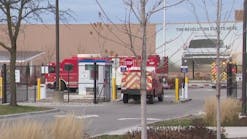Meet Crystal Yates, the Philadelphia Fire Department’s assistant deputy commissioner for EMS.
- Pride in numbers: "When I started this job there were so few women that I knew every one of them. ... I’m proud to say I don’t know them all today.”
- Tough calls: "The calls that impacted me the most were when a child, no matter how old they were, was in cardiac arrest and the parents were telling me ‘Do something! Save them!’”
Crystal Yates did not want to do this interview.
Despite her status as one of the highest-ranking women in the Philadelphia Fire Department, Yates — the first woman to head the city’s paramedics at the executive level as assistant deputy commissioner for emergency medical services — is humble and keeps a low profile.
Unsure about the attention I wanted to shower upon her, Yates called up one of her mentors, Linda Long, the first female fire battalion chief in the department’s history, to ask if she should talk to me.
Long told her to do it, for any young women who might read her story and be inspired. Then Long told her something else: She was the one who gave me Yates’ name.
“She’s still mentoring me,” Yates, 48, said, smiling.
Growing up the daughter of a firefighter in Mount Airy, Yates spent a lot of time at firehouses but never saw any women there. Philly didn’t hire its first female firefighter until 1985.
“I never even thought about this as a career because there were no women at the time,” she said.
Yates, a mother of two, was working in insurance when her dad told her the department was recruiting paramedics.
“I got the job and absolutely fell in love with it,” she said.
Yates started in 1998 at Engine 59, Medic Unit 4, in Nicetown. To her, that’s still home. When she visited earlier this month, she fell right back in to joking with the guys in the kitchen. And when she hopped in the ambulance, a look akin to love fell over her face.
“It feels like home," she said. “I might take a run.”
In a city that averages about 300 homicides a year and marked 1,116 opioid deaths in 2018, its paramedics are among the busiest in the nation. Last year, medics responded to about 800 calls each day.
The patients they see are usually in the worst throes of their lives and the hospitals they take them to are often overcrowded.
“So they have to manage and juggle all of this for 12 hours while still making good medical decisions,” Yates said.
Before becoming a paramedic, Yates was someone who felt like fate was messing with her when things would go wrong. But now she’s “had the opportunity to see people that really are having issues and problems and emergencies,” she said.
“My level of complaints has dropped," she said. "It really helped to just put life in perspective for me.”
Yates worked at several medic units before being promoted to lieutenant in 2005 and working her way up the ranks.
In 2017, she made history — along with her mentor, Long — when they were sworn in together, Yates as the first black woman to be paramedic services chief and Long as the first woman to become fire battalion chief.
“I was proud and sad. I was most proud because my dad was so proud,” Yates said. “But it was also kind of sad because that was in 2017. Imagine the first fire department in the United States and we’re all the way in 2017 before that happens.”
Later that year, Yates was promoted again, to assistant deputy commissioner for EMS. She is currently the highest-ranking woman in uniform in the department.
Yates has pushed community outreach and helped create innovative response units like AR-2, which pairs paramedics and case managers to respond to opioid overdose calls.
But to Yates, the most pressing health crisis Philadelphia faces isn’t drugs or gun violence — it’s poverty.
“We know the social determinants of health, so everything all boils down to poverty,” she said.
Yates is also in an executive MBA fellowship program at Yale University for minority leadership in health care, which Fire Commissioner Adam Thiel talked her in to applying for.
After it’s all over, she hopes to be equipped with the knowledge and language to affect health care policy in this city and beyond.
“I really, really deeply love Philadelphia," she said. “I want to be able to sit at whatever policy table will be able to impact Philadelphia positively.”
———
©2019 The Philadelphia Inquirer
Visit The Philadelphia Inquirer at www.inquirer.com
Distributed by Tribune Content Agency, LLC.






